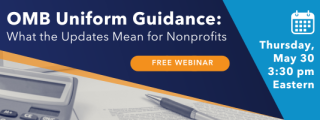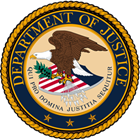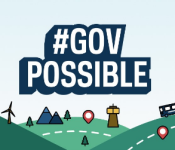Free Nationwide Nonprofit Webinar

OMB Uniform Guidance: What the Updates Mean for Nonprofits
Thursday, May 30 from 3:30 – 4:30pm Eastern
Last month, the federal Office of Management and Budget (OMB) released a major rewrite of the Uniform Guidance that is exceedingly supportive of charitable nonprofits. The new revisions address longstanding problems in covering nonprofits’ actual costs, advance equity by making grants accessible to more organizations and communities, and make other significant reforms that will reduce bureaucratic barriers and burdens and costs of seeking, performing, and reporting on grants involving federal funds.
Learn how the reforms will directly benefit your charitable organization by joining a special, nationwide free webinar, OMB Uniform Guidance: What the Updates Mean for Nonprofits, on Thursday, May 30 at 3:30 – 4:30 pm Eastern.
DOL Overtime Rule Raises Salary Threshold Requirements
On Apr. 23, 2024, the U.S. Department of Labor (DOL) published its Overtime Final Rule designed to update and revise overtime protections for millions of workers employed by nonprofits, for-profits, and governments. The final rule is set to start going into effect in three phases beginning in less than two months, all focused on the same provision in federal law: the minimum salary that employers must pay their white-collar employees to exempt them from overtime pay of time and half of wages for hours worked in excess of 40 in any week. The first phase starts on July 1, 2024, when the standard salary threshold goes up to $844 per week/$43,888 per year (from the current level of $684 per week/$35,568 per year). This increase is essentially an inflation adjustment of the level set by the Trump Administration in 2019. In the next phase, effective January 1, 2025, the salary level will rise to $1,128 per week or $58,656 per year. In the third phase, beginning July 1, 2027, the salary threshold will be automatically adjusted for inflation every three years. DOL is also using the same timed phase-ins to adjust the special threshold for highly compensated employees, a threshold that reduces the level of needed scrutiny about the duties the individual employees must perform to be exempt.
Numerous business organizations have announced their plans to challenge the Overtime Final Rule, seeking to block or delay implementation. That strategy was successful in 2016 when a federal judge ruled unlawful an Obama-era set of overtime changes that were more expansive. The Biden Administration, however, has sought to address that court’s ruling so as to survive scrutiny and implement the higher salary level thresholds. Charitable nonprofits should get up to speed on the changes and prepare to make adjustments ahead of the rapidly approaching start dates.
| Effective Date | Standard Salary Threshold | Highly Compensated Salary Threshold |
|---|---|---|
| July 1, 2024 | Rise to $844 per week/$43,888 per year (up from $864 per week/$35,568). | Rise to $132,964 per year from $107,432; individuals must be paid minimum of $844 per week. |
| January 1, 2025 | Goes up again $1,128 per week or $58,656 per year. | Increases to $151,164 per year; individuals must be paid at least $1,128 per week. |
| July 1, 2027 | New rate automatically adjusted for inflation every three years. | New rate automatically adjusted for inflation every three years. |
Worth Reading
- Overtime Final Rule, U.S. Department of Labor, announced Apr. 23, 2024 (formal publication on Apr. 26, 2024).
- What the New Overtime Rule Means for Workers, Jessica Looman, U.S. Department of Labor blog, Apr. 23, 2024.
- NCN Analysis: Evaluating the U.S. Department of Labor's Overtime Final Rule, National Council of Nonprofits, Apr. 23, 2024.
- Compliance Tips: Don’t Panic (Yet): What Your Nonprofit Needs to Know About the (Latest) New Final FLSA Overtime Rule, North Carolina Center for Nonprofits, Apr. 25, 2024.
House Expands Discriminatory Ban on Nonprofit Earmarks
In reaction to some community funding projects (earmarks) going to a few LBGTQ organizations in fiscal year 2024, House Republicans announced late last month that they are banning all charitable nonprofits from receiving this funding out of the Economic Development Initiative of the Department of Housing and Urban Development. The National Council of Nonprofits denounced the discriminatory exclusion of nonprofits in a statement, explaining that the “blanket ban against funding for all nonprofits will tear away needed funding from organizations that their constituents depend on,” and “threatens the public’s health and wellbeing.” In a letter to House leaders last week calling for the removal of the ban, CEOs from 11 of the nation’s largest charitable nonprofits and faith-based organizations providing human services explained, “The HUD Economic Development Initiative (EDI) is one of the few sources of funding that organizations like ours can secure for the construction, expansion and renovation of our buildings, which in many cases offer the only safe spaces and supportive programming in the communities we serve.” The new ban on certain earmarks to nonprofits adds onto a ban imposed last year on direct funding for charitable organizations in the Health and Human Services spending bill.
Worth Quoting
- “Under this new restriction, vital funding that Members of Congress know their constituents need for domestic violence shelters, food banks in economically disadvantaged neighborhoods, youth and senior centers, affordable ready-to-build housing, and more that the public relies on nonprofits to deliver will be denied.”
— Tim Delaney, President & CEO, National Council of Nonprofits, in National Council of Nonprofits Statement on Exclusion of Nonprofits from Future Housing and Urban Development Earmarks, National Council of Nonprofits, Apr. 25, 2024.
Worth Reading
On earmarks generally
- House: Community Project Funding Request Guidance, House Appropriations Committee, April 2024.
- Senate: Guidance on Congressional Directed Spending Requests, Senate Appropriations Committee, April 2024.
On the discriminatory ban
- Nonprofits balk at new GOP spending rule that could cost them $1B, (paywall) Katy O’Donnell, Politico, May 3, 2024.
- Nonprofit Leaders Lobby To Get Earmark Ban Lifted, Eric Obernauer, The NonProfit Times, May 3, 2024.
- House GOP’s ‘discriminatory’ funding change draws ire of Democrats, Aris Folley, The Hill, May 1, 2024.
Citizenship Question on the U.S. Census
The House is scheduled this week to vote on the Equal Representation Act (H.R. 7109), a bill to mandate the inclusion of a citizenship question on the 2030 and subsequent censuses. Numerous groups object to the proposal out of concern that a citizenship question would undermine an accurate census in every community and violate the Constitution’s equal representation clause. The question would intimidate residents of foreign descent, both documented and undocumented, resulting in flawed data due to large undercounts of entire groups of residents. The National Council of Nonprofits sent a letter expressing strong opposition to the bill to every House office explaining that any undercount resulting from the inclusion of a citizenship question will harm individuals and charitable nonprofits because adding a citizenship question would adversely impact (1) dollars and nonprofit sustainability, (2) data and nonprofit effectiveness, and (3) democracy and the public’s trust in government.
Federal FastView
- Hearings on DAF Proposed Regulations: Today and tomorrow (May 6 & 7) the Internal Revenue Service and Department of the Treasury are holding public hearings on proposed regulations seeking to clarify the rules governing donor advised funds (DAFs). The National Council of Nonprofits submitted comments in February that focus on the proposed regulations as well as potential future regulations that can further the goal of increasing the distribution of dollars controlled by DAFs to the work of charitable nonprofits. In April, 33 members of the U.S. House Ways and Means Committee sent a letter to the U.S. Treasury Secretary expressing concerns about the proposed regulations.
- Ways and Means Tax Teams Announced: With the expiration of the 2017 tax law at the end of next year, the Chair of the House Ways and Means Committee recently announced the creation of 10 “tax teams” to review the performance of the expiring provisions and propose revisions. The Republican-only teams do not focus on charitable nonprofits directly, but several, including ones considering the American Workforce, Community Development, Rural America, and Working Families will likely address issues important to the work of charitable organizations. Other teams, such as American Manufacturing, Global Competitiveness, and Supply Chains, suggest a focus on for-profit business concerns. It is unclear when or whether meetings of the tax teams will be open to the public or if input from the nonprofit sector will be sought.
- Protections for People with Disabilities: The U.S. Department of Health and Human Services (HHS) finalized a rule to protect people with disabilities from experiencing discrimination in “any program or activity receiving funding from HHS” under Section 504 of the Rehabilitation Act. The final rule, effective in early July, aims to ensure that treatment decisions for people with disabilities are not based on biases, stereotypes, or judgments. It also defines what accessibility means for websites and applications and sets a standard for the care and services that can be provided through those platforms.
- Proposed Student Loan Debt Cancellation Plan: Last month, the Biden Administration published a Notice of Proposed Rulemaking on its latest student loan debt cancellation plan to eliminate some accrued interest, automatically forgive certain qualifying borrowers in certain payment plans including Public Service Loan Forgiveness (PSLF) and other income-driven repayment plans like SAVE without requiring paperwork, and potentially lower monthly payments for certain borrowers. Some income-driven repayment plans do not cover the interest accrued each month, resulting in the borrower’s debt continuing to balloon. The plan would cancel up to $20,000 of the borrower’s accrued interest that had grown due the payment structures. Other debt would be cancelled for borrowers who have been in repayment for 20 years or more on undergraduate loans or 25 years or more on graduate loans. The government invites the public to submit comments on the proposal by May 17. See Biden-Harris Administration Releases First Set of Draft Rules to Provide Debt Relief to Millions of Borrowers.
- Census Bureau Questions on Sexual Orientation and Gender Identity: On May 1, the U.S. Census Bureau announced that it is seeking comments on its proposed testing of questions related to sexual orientation and gender identity on the American Community Survey. The list of questions would apply to people in a household “15 years of age or older,” and include questions about assigned sex at birth and current gender identity, as well as sexual orientation. According to the Census Bureau, it is proposing testing these questions to “meet the needs of other federal agencies that have expressed interest in or have identified legal uses for the information, such as enforcing civil rights and equal employment measures.” Since the questions are only in the testing stage, they will not be official federal statistics. The public is invited to submit comments by May 30, 2024.
Election Tip

DOJ Protections for the Polls
The U.S. Department of Justice launched its Voting and Elections webpage, an updated “one-stop resource” for voting and elections information for voters and election officials. The resources are a combination of efforts from the Civil Rights Division, Criminal Division, National Security Division, and U.S. Attorneys’ Offices across the country to “ensure all qualified voters have the opportunity to cast their ballots and have their votes counted free of discrimination, intimidation, or criminal activity in the election process.” Guides are provided on identifying voter intimidation, how to report misconduct and threats against election workers, voting protection guides in the language of minority citizens, protections for voters with disabilities, drop box accessibility, and more.
Addressing the Nonprofit Workforce Shortage Crisis
Data collected in recent years document why, how, and to what extent charitable organizations have been experiencing extensive job vacancies, difficulties recruiting and retaining qualified staff, longer waiting lines for services, and more. Similar reports of hiring challenges come from state and local governments as well. In response, policymakers continue to make strides in addressing the workforce crisis, notably in promoting quality, affordable child care and removing barriers to program and service delivery.
Program and Service Delivery
Pending bills and initiatives seek to address workforce shortages in program and service delivery, identified as the category with the most vacancies by respondents to the 2023 nonprofit workforce shortage survey report.
- Expanding the Workforce: Companion bills in Massachusetts seek to diversify the “workforce of licensed social workers in the Commonwealth.” They would provide graduate social work students a stipend for their field placements and allow Licensed Independent Clinical Social Workers to earn continuing education credits for supervising specified social workers. The Illinois Department of Children and Family Services announced that it shortened the hiring time for “frontline workers” after finding that previous candidates said the state took too long to make an offer.
- Interstate Compacts: In April, Maine’s legislature passed a bill to join an interstate compact for social worker licensure, which would reduce the barriers for social workers to practice in new states. Kansas Governor Kelly signed a bill that authorizes clinical counselors to practice in compact states, allows state residents to receive telehealth services from counselors in other states, and “amends the law to add a licensure fee relating to the privilege to practice under the compact.”
Child Care
A new bill in Colorado would, among other things, create an income tax credit up to $3,200 for certain taxpayers with eligible children under 5 years of age to help parents pay for child care. Nebraska has enacted legislation to exempt nonprofit child care facilities from property taxes, permit child care licensees to obtain dual licenses to comply with attendance requirements, streamline background checks, and more. Another new Nebraska law removes income eligibility restrictions on child care providers to receive child care subsidies. In North Carolina, a trio of bills seek to reduce costs to families, increase salaries of child care workers, and improve reimbursement rates for providers. One measure would provide financial assistance to child care facilities focused on low-income families and increase the wages of and support professional development for child care. Another bill would reduce fees for subsidized child care and the third would raise the base reimbursement rates for nonprofit and other child care centers.
Worth Reading
- ‘We can’t exist without child care’: Rural towns use state funding to open local centers, Makenzie Huber, South Dakota Searchlight (reprinted in Route Fifty), Apr. 26, 2024.
Analysis
Legal Threats to Nonprofits and Civil Society
A recent article, 10 Major Legal Threats to U.S. Civil Society, exposes the increasing legal challenges confronting nonprofits in the form of restrictive new laws, aggressive enforcement, and political attacks that charitable nonprofits encounter simply for advancing their missions in communities. For example, state attorneys general and lawmakers in Georgia, Indiana, and Texas, and some cities have taken action to criminalize the humane acts of providing food and shelter for migrants and homeless people, offering assistance to women seeking health care, and providing bail for incarcerated individuals. Numerous states have sought to impose bans preventing many charitable organizations from providing diversity, equity, and inclusion programs and trainings. Free speech rights have also come under attack. Other threats identified in the article include efforts to destroy the law protecting nonprofit nonpartisanship (i.e., the longstanding Johnson Amendment), expanding use of “foreign influence” laws against nonprofits, litigation challenging civil rights laws, and other attempts under color of law to politicize the charitable sector. The article ends with a call to action: “In the face of these legal threats to the sector, it is more important than ever for people to join together to support their communities and have their voices heard.” Indeed.
Numbers in the News
$62.8 billion
The amount of financial relief earned and provided to government and nonprofit employees for dedicating themselves to serving the public for at least 10 years, under the Public Service Loan Forgiveness program, benefitting 876,000 borrowers in every state and congressional district.
Source: PSLF Forgiveness by Congressional District, U.S. Department of Education, April 2024. See news release for more information on additional initiatives.
12.1 million
The number of tax returns that included a charitable contribution deduction in Tax Year 2022, a 0.3% decrease from Tax Year 2021. More than 31% of deductions were reported by households with an adjusted gross income of between $100,000 and under $200,000.
Source: Preliminary Data: SOI Tax Stats – Individual Income Tax Returns, Internal Revenue Service, Apr. 30, 2024.
May is
- Asian American, Native Hawaiian, and Pacific Islander Heritage Month
- Jewish American Heritage Month
- Mental Health Awareness Month
- National Foster Care Month
This Week is

Public Service Recognition Week (May 5-11).
Performance.gov is celebrating those who are making #GovPossible! Download the #GovPossible toolkit to show your gratitude for public servants.
Nonprofit Events
- May 14, Washington State Nonprofit Conference, Nonprofit Association of Washington
- May 14-16, Wyoming Nonprofit Conference, Wyoming Nonprofit Network
- May 16, NH Nonprofit Conference & Expo, New Hampshire Center for Nonprofits
- May 22, 12th Annual Caring Force Rally, Providers’ Council (Massachusetts)
- May 29-30, NDANO 2024 Nonprofit Leadership Conference, North Dakota Association of Nonprofit Organizations
Presenting People With Purpose
Data consistently demonstrate that charitable nonprofits provide meaningful impact in their communities. They address immediate and long-term needs of residents. Organizations uplift lives and quality of lives for millions through faith, culture, education, and caring. Plus, very many charitable nonprofits work to improve our environment, overcome discrimination and other barriers to success, and much, much more.
So why don’t policymakers know or acknowledge all of this to be true and prioritize policies that enhance rather than hinder nonprofit impact? One answer is because they don’t know us; they often don’t even see us or know the people motivated by purpose in their communities. The Michigan Nonprofit Association is working to change that through it’s We are 501c3 series of short videos.
Stay in the Loop
Want to be the first to know policy developments and operational trends affecting nonprofits? Sign-up to receive our free newsletters, Nonprofit Champion and Nonprofit Essentials, and browse the archive of past editions.
Sign-up